
Botanični vrt Univerze v Ljubljani je bil letos spomladi s strani svetovne organizacije botaničnih vrtov BGCI (Botanic Gardens Conservation International) s sedežem v Londonu povabljen na preizkus še ene akreditacije, ki se nanaša na področje varstvene biologije-konkretneje varovanja rastlinskih vrst. Med enajstimi izbranimi vrtovi na svetu od 3500-tih, je te dni prejel certifikat, da je uspešno opravil akreditacijo in pridobil naziv BGCI conservation practitioner. Za majhno Slovenijo je že izbor v krog izbranih pomenil veliko, pridobljena akreditacija pa potrjuje, da Botanični vrt Univerze v Ljubljani s svojim znanjem in aktivnostmi uspešno opravlja zelo pomembno poslanstvo varovanja rastlinskih vrst na lokalnem in svetovnem nivoju.
V nadaljevanju je izjava za novinarje Svetovne organizacije in seznam prvih 11 vrtov na svetu, ki so prejemniki te akreditacije.
BGCI Launches Conservation Practitioner Accreditation and Announces First BGCI Accredited Conservation Practitioners
Richmond, United Kingdom (1 August 2018) — Botanic Gardens Conservation International (BGCI) will accept applications for the BGCI Conservation Practitioner Accreditation from today.
BGCI Conservation Practitioner Accreditation recognises excellence in plant conservation policy, practice and education, and accredits botanic gardens carrying out plant conservation activities of local, national or global importance.
The following botanic gardens are the first recipients of BGCI’s Conservation Practitioner Accreditation:
• Denver Botanic Gardens, United States
• The Eden Project, United Kingdom
• Hortus botanicus Leiden, Netherlands
• Huntington Library, Art Collections and Botanical Gardens, United States
• Jardin Botanico de la Universidad Autonoma de Puebla, Mexico
• Montgomery Botanical Center, United States
• National Botanic Garden of Wales, United Kingdom
• North Carolina Botanical Garden, United States
• University Botanic Gardens Ljubljana, Slovenia
• Stellenbosch University Botanical Garden, South Africa
• Wollongong Botanic Garden, Australia
BGCI accreditation ensures that gardens adhere to international standards, results in tangible benefits for participating gardens – such as recognition, peer review, creating standards for excellence, and funding – and acts as a motivator for botanic garden leadership.
Botanic Gardens can also apply for BGCI Botanic Garden Accreditation and will soon be able to apply for BGCI Advanced Conservation Practitioner Accreditation.
The BGCI Botanic Garden Accreditation, which has been developed in collaboration with a number of BGCI member gardens, is aimed at botanical institutions wishing to establish their credentials as botanic gardens adhering to internationally recognised standards.
The BGCI Advanced Conservation Practitioner Accreditation recognises botanic gardens with a focus on conservation actions that support local, national or global conservation goals. It is only available to BGCI members.
For more information on BGCI’s Botanic Garden Accreditation Scheme, please visit www.bgci.org/accreditation.
Statements from the First BGCI Accredited Conservation PractitionersThe Eden Project
“We believe that BGCI Conservation Practitioner Accreditation provides both the process and status associated with a good quality conservation practitioner,” said Chris Bisson, Operation Earth Programme Manager for Eden. “This standardization process is also a way of showing partner organisations, other gardens and institutions that Eden Project has achieved a certain level of quality in conservation projects.”
Denver Botanic Garden
“BGCI Conservation Practitioner Accreditation will help in raising awareness about conservation as well as funding,” said Jenny Ramp Neale, Director of Research & Conservation at Denver Botanic Garden.
Hortus botanicus Leiden
"We want to know what is going on, we want to add to conservation and learn from others," said Hanneke Jelles of Hortus Botanicus Leiden. "In our situation education on conservation will be most important, as in a small city garden we don't have the facilities to have large numbers of one species. We can connect scientists, students and public to communicate on this important subject."
The Huntington Library, Art Collections, and Botanical Gardens
“Having a community standard is a good thing,” said Sean Lahmayer, Plant Conservation Specialist at Huntington. “Everyone is aware of where the line is drawn.”
Jardin Botanico de la Universidad Autonoma de Puebla
“BGCI Conservation Practitioner Accreditation gives recognition to our conservation activities,” said Alan Coombes of Jardin Botanico de la Universidad Autonoma de Puebla. “We hope the gardens receive more funds to support their conservation activities at a higher level.”
Montgomery Botanical Center (MBC)
“Conservation is a big part of our mission and purpose,” said Patrick Griffith, Executive Director of Montgomery Botanical Center. “Having an international accreditation, specifically tailored for botanic gardens, would help MBC to validate our impact and importance to our funders, our local government, and our local community.”
National Botanic Garden of Wales
“The BGCI Conservation Practitioner Accreditation highlights our conservation work to local and national stakeholders, government and the public,” said Will Ritchie, Curator of the National Botanic Garden of Wales.
North Carolina Botanical Garden
“BGCI Conservation Practitioner Accreditation legitimizes and give credibility to everything we do,” said Damon Waitt, Director of North Carolina Botanical Garden.
Stellenbosch University Botanic Garden
“BGCI Conservation Practitioner Accreditation should help to improve recognition of the importance of a garden by the authorities,” said Stuart Hall of Stellenbosch University Botanic Garden. Accreditation will hopefully also improve possibilities to source funding for further developing the garden's ability to fulfil conservation goals.”
University Botanic Gardens Ljubljana, Slovenia
“The value of being a BGCI Conservation Practitioner is big, because plant conservation is nowadays very important on state levels and in the world,” said Jože Bavcon, Director of the University Botanic Gardens Ljubljana. “Being a BGCI Conservation Practitioner gives the garden possibilities to apply for different conservation projects and programmes. The Accreditation is also recognition for the garden, that this is the right way to do plant conservation.”
Wollongong Botanic Garden
“BGCI Conservation Practitioner Accreditation provides global and local recognition,” said Paul Tracey, Curator of Wollongong Botanic Garden. “It also validates the work we are doing in our organisation.”
Further Information on BGCI’s Botanic Garden Accreditation Scheme
BGCI’s Botanic Garden Accreditation is designed to be as inclusive as possible, but still ensure a level of standards across botanic gardens. For this reason, the criteria it measures will assess and value the fundamental components of a botanic garden.
To be accredited as a BGCI Botanic Garden, institutions will need to show that they carry out a range of conservation-related policies, practices and activities. For the Conservation Practitioner and Advanced Conservation Practitioner accreditation, botanic gardens will need to show that they are carrying out a wide range of conservation actions.
For successful applicants, Certificates of Accreditation will be issued together with a logo that recipients can use on their website, letterhead, etc. Recently accredited gardens will be highlighted on the BGCI website and in the BGCI newsletter, Cultivate. In addition, recently accredited Advanced Conservation Practitioners will be publicised in BGjournal, the journal for botanic gardens. Accreditation will be granted for a period of 5 years, after which gardens will have to renew their application. Gardens can apply to move up a level at any time.
Wherever possible, BGCI will work with national and regional associations to co-brand and manage accreditation.
BGCI was established in 1987 to mobilise botanic gardens and engage partners in securing plant diversity for the well-being of people and the planet. BGCI now has 508 members in 92 countries. Please visit www.bgci.org for more information.







